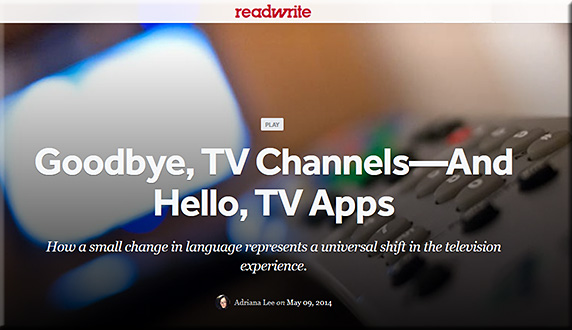Goodbye, TV Channels—And Hello, TV Apps — from readwrite.com by Adriana Lee
How a small change in language represents a universal shift in the television experience.
Excerpt (emphasis DSC):
But television is evolving. Increasingly, it’s all about the apps now—browsable, downloadable, interactive TV applications. You can thank the swelling ranks of streaming services and devices for that.
The software applications they’re delivering to our living rooms are growing in number and prominence. And they’re starting to eclipse the passive, one-way broadcasts we once fought over for two-way, interactive experiences that let you share democratically among multiple users (née viewers) across mobile devices and computers.
…
According to research firm NPD Group, the smart television business has begun to boom. In the beginning of 2013, there were 140 million Internet-ready TVs in American homes. By 2015, it will grow 44 percent, to 202 million. And by that time, nearly two-thirds of them will actually be connected to the Internet, compared to just 56 percent now.
…
How they connect is important. When it comes to television, “apps” are where it’s at, not ye olde “TV channels.” It’s just a shift in language, true—but it’s also a shift in thinking.
In a multi-screen future, phones don’t control TVs, TVs control phones — from foxnews.com by Alex Tretbar
Excerpt:
Right now, most “second-screen” usage is more distracting than it is enriching, but that’s about to change. Soon your tablet will spring to life when you tune into your favorite show, and you’ll have more opportunities than ever to engage. The million-dollar buzzword here is Automatic Content Recognition, or ACR. But, before we get too far into that, let’s start at the beginning: the screen itself.
…
Navin wants his apps to automatically deliver content viewers might otherwise seek out manually. This might mean recommendations, related video, social-media discussions, or even a simple plot synopsis.
What television will look like in 2025, according to Netflix — from wired.com by Issie Lapowsky
Excerpts:
People have traditionally discovered new shows by tuning into the channels that were most aligned with their interests. Love news? Then CNN might be the channel for you. If it’s children’s programming you want, Nickelodeon has you covered. And yet, none of these channels can serve 100 percent of their customers what they want to watch 100 percent of the time.
According to Hunt, this will change with internet TV. He said Netflix is now working to perfect its personalization technology to the point where users will no longer have to choose what they want to watch from a grid of shows and movies. Instead, the recommendation engine will be so finely tuned that it will show users “one or two suggestions that perfectly fit what they want to watch now.”
“I think this vision is possible,” Hunt said. “We’ve come a long way towards it, and we have a ways to go still.” He said Netflix is now devoting as much time and energy to building out that personalization technology as the company put into building the infrastructure for delivering that content in the first place.
…
“The stories we watch today are not your parents’ TV,” Hunt said, “and the stories your kids watch in 2025 will blow your mind away.”
And by the year 2025, he told his audience, everyone will own a smart TV.
TV transformed by smart thinking — from theaustralian.com.au/ by
Excerpt:
As LG puts it, your apps to the right of the cards are “the future” — what you will watch, while the display of your recently used apps, to the left of the cards, is “the past” — so the launcher is an amalgam of your past, present and future viewing activity
From DSC:
“…everyone will own a smart TV by 2025.” Well, maybe not everyone, but many of us will have access to these Internet-connected “TV’s” (if they are even called TV’s at that point).
I hope that Netflix will license those personalization technologies to other vendors or, if not, that some other vendor will create them for educationally-related purposes.
Can you imagine a personalization engine — focused on education and/or training — that could provide the scaffolding necessary for learning about many topics? i.e. digital playlists of learning. Streams of content focused on education. Such engines would remember where you left off and what you still need to review…what you have mastered and what you are still struggling with…what you enjoy learning about…your learning preferences…and more.
![The Living [Class] Room -- by Daniel Christian -- July 2012 -- a second device used in conjunction with a Smart/Connected TV](http://danielschristian.com/learning-ecosystems/wp-content/uploads/2012/07/The-Living-Class-Room-Daniel-S-Christian-July-2012.jpg)
Addendum:
How Samsung is enabling the future of social TV — from lostremote.com by Natan Edelsburg









